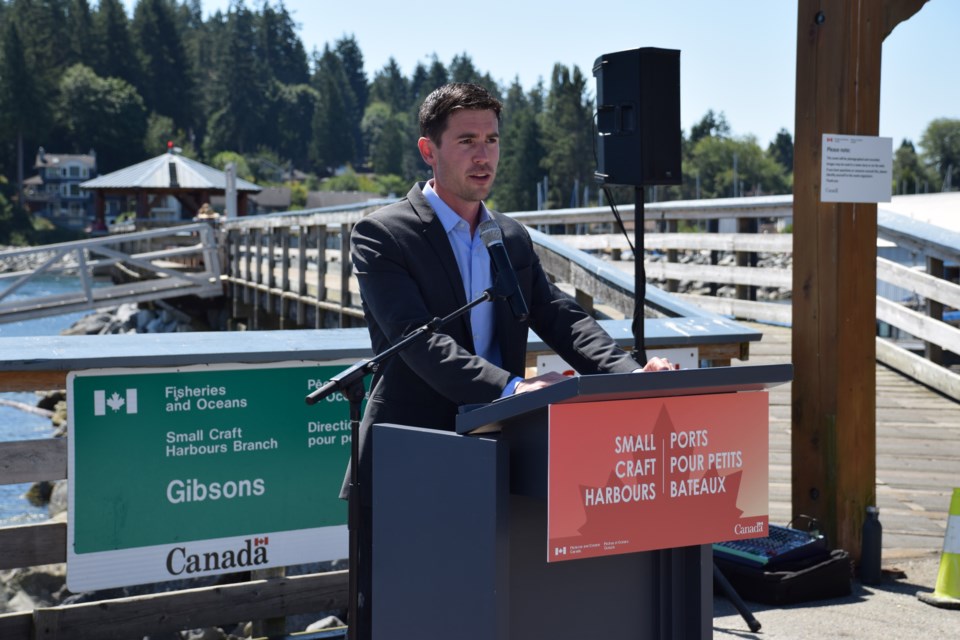Like his Liberal colleagues, West Vancouver-Sunshine Coast-Sea to Sky Country MP Patrick Weiler has dismissed the letter sent to Liberal and NDP MPs by Pierre Poilievre encouraging them to vote against the April 1 carbon pricing increase.
“It’s not altogether surprising,” said Weiler in an interview with Pique.
“It does bring me back to December, when [Pierre] Poilievre and the Conservatives were having a bit of a temper tantrum that they were going to keep all MPs through the holiday season to axe the tax and sure enough, after a few hours that was over and we voted on what we needed to vote on, and then people went home for the holidays.
“This letter is right in the same vein.”
Weiler said there are multiple votes coming up to do with the end of the financial year.
“They’re all confidence votes—this isn’t about the carbon tax, but that’s what he wants to make it about and that’s how he wants to talk about it. Fine.”
In the letter, sent March 14 to Liberal and NDP MPs, Poilievre asked they join the Conservatives in voting against the scheduled federal carbon tax increase, set to kick in April 1.
It’s an annual increase that will continue through to 2030, though B.C. has its own carbon tax that negates the federal tax.
But that didn’t stop Poilievre from getting into it with B.C. Premier David Eby about British Columbia’s own carbon tax.
“It’s really what the premier [David Eby] termed very appropriately as ‘the baloney factory,’" said Weiler.
“It’s trying to frame the price on pollution as if it's responsible for the cost-of-living challenges that we have in Canada right now, but really it's just a scapegoat that [Poilievre is] using to undermine climate action.”
Weiler argued most Canadians end up better off under the federal carbon pricing scheme due to rebates.
“When you look at how that works, it's only people that are, on average, making more than $250,000 that end up paying more.”
The government offers carbon rebates to Canadians based on their income.
As a key part of the Liberal government’s climate plan, Weiler said he would of course be voting against any efforts by the Conservatives to stop the carbon pricing scheme’s scheduled increase.
“It’s going to be responsible for 30 per cent of the emissions reductions we have planned to make between now and 2030,” he said.
“And it's not just about affordability—we’re seeing the impact of climate change right now, especially in B.C. It was 20 C over the weekend in West Vancouver, and that’s breaking records for this time of the year.
“It really underscores the necessity for us to do what we can to fight against climate change, because the alternative is much much costlier and it’s going to leave a country and a world that is much less livable for our generation and for future generations too.”
Conservative candidate for West Vancouver-Sunshine Coast-Sea to Sky Country, Keith Roy, said in an email continued increases in the carbon pricing scheme are irresponsible considering cost-of-living pressures on Canadians.
“After eight years of this Liberal-NDP government, life in West Vancouver-Sunshine Coast-Sea to Sky Country has never been more expensive, yet Justin Trudeau and the NDP have decided to hike the carbon tax again on April 1 by 23 per cent,” he said.
“I was talking with a farmer in Pemberton on Monday who explained that almost every piece of machinery on his farm runs on diesel fuel and there are no reasonable alternatives. The increased fuel cost for farmers has a direct impact on the high price of food.”
Roy said Weiler “should have listened to his constituents” and voted to stop the increase.
“Instead, Mr. Weiler voted to make the hardworking people of West Vancouver-Sunshine Coast-Sea to Sky Country pay even more for gas, food and heating.”
Roy said he supports efforts by Conservatives in Parliament to call a vote of no confidence in Justin Trudeau in order to force “a carbon tax election,” and “turn the hurt Trudeau caused into the hope that Canadians need.”
For his part, Weiler described the Conservative campaigning on the issue as dishonest, and a distraction from efforts to fight climate change.
“It would be one thing if the Conservatives were proposing a different plan of their own, but the fact of the matter is they reject any action on climate change … the only thing they’ve proposed is extracting more fossil fuels in Canada as their plan to fight climate change—it’s really not serious, and by trying to scapegoat the price on pollution it is really dishonest and it mischaracterizes what it does at the same time.”
The federal carbon pricing scheme will increase on April 1, with the price on carbon to go from $65 a tonne to $80, and will continue to go up annually until it reaches $170 a tonne by 2030.
BC.'s own carbon tax currently sits at $65 a tonne, and will also increase on April 1.




